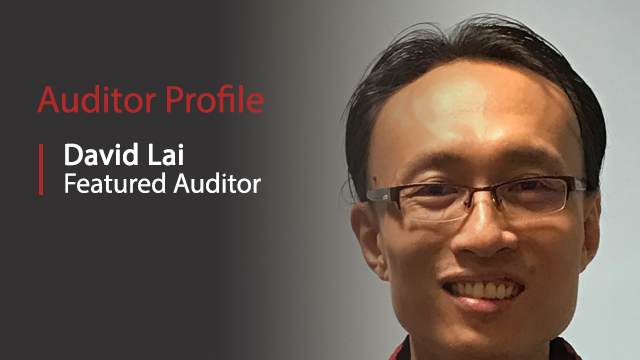Lai Cherng Yuh (David Lai), ASQ CQA, is quality system manager at SunPower Manufacturing in Malaysia. With more than 17 years auditing experience, Lai has numerous quality roles under his belt which have helped him hone his skills.
Here, Lai reflects on his career and shares his opinions on how to improve auditing and the much talked about ISO 9001:2015.
What does your role involve? What does a typical day look like for you?
I am responsible for the development, maintenance, and improvement of integrated management systems for our site. I manage a group of internal auditors who plan and conduct various types of process audits and system audits. We work closely with our EHS team to ensure integration of EMS and OHSAS.
I am normally involved in process compliance and effectiveness audits, especially for newly deployed processes. One of my roles is to review audit findings with the auditee and their supervisors after an audit. On top of this, I also perform quarterly analysis of the audit findings and provide holistic preventive measures to address systemic issues.
How long have you been in the profession?
I have 13 years of quality auditing experience. I started working as an internal auditor in June 2000. Between 2003 to 2007 I was also assigned other roles such as R&D engineer and process engineer.
Why did you want to become an auditor?
I wanted to become an auditor so I could contribute my ideas and share experiences for improving processes and systems. As an auditor, I don’t want to stop at being compliant to a standard. I would like to take the organization to the next level of maturity and help them make the journey towards excellence.
What is your history in the profession?
I have been assigned roles such as R&D engineer and process engineer—which enriched my experiences and laid down a strong foundation as I continue to dive deeper in the auditing profession. Other than that, I am a certified ASQ CQA, ISO 9001 lead auditor, and ISO 14001 lead auditor.
What have been some highlights of your career?
I successfully led a business excellence team in our SunPower Malaysia manufacturing site to achieve the Malaysia state level 2015 Chief Minster Industrial Excellence Award. I also successfully helped the team to become a finalist in the Malaysia Business Excellence Award –Anugerah Kecemerlangan Industry, which is a Malcolm Baldrige Award equivalent. SunPower Malaysia was also awarded a Malaysia Productivity Innovation Class.
I have also helped implement our SunPower business maturity assessment, Prevention-Simplification-Customer Satisfaction. We improved from a baseline assessment in 2011, subsequently achieving bronze, silver and now gold level in 2017.
What do you like the most about being an auditor?
I have the opportunity to assess to the overall quality management system of the company and am empowered to identify and suggest areas for improvement. This is an opportunity for me to add value to the overall system of our organization.
What do you like the least about being an auditor?
Balancing cost vs. the ideal preventive system when providing suggestions for improvement.
What is the most challenging part of your job?
Being challenged by the auditee when they do not agree with the classification of the audit findings— especially on a non-conformance case. Another challenge is to convince the auditee to proliferate the preventive measures to all similar or relevant processes as sometimes the implementation of the preventive measures are constrained by budget limitations.
How do you use technology in your job as an auditor?
I encourage auditees to setup online monitoring control and mistake-proofing systems to prevent potential quality issues which may be incurred due to human error. On top of this, my team makes use of their smartphones to capture photos to serve as evidence of audit findings.
What are the most pressing issues facing the profession at the moment?
The current ISO 9001:2015 requirements are too ambitious to cater for all sizes and natures of industries, which may potentially dilute the gist and original intent of the requirements.
There are a wide range of different interpretations of ISO 9001 requirements and auditors worldwide have not come to agreement. The expectations and practices of auditors sometimes depend on their background and influence of their culture.
Do you have any tips for auditors to improve the standard of auditing?
Proper planning is one of the main factors that contribute to the success of the auditing. To manage the audit better, it is advisable to prepare an audit checklist, even though it is not mandatory as we use the process approach auditing methodology. Having an audit checklist prepared can prevent the auditor from missing out on critical audit scope and can help the auditor stay focused.
Is there anything else you would like to comment on?
In my company we have developed an innovative holistic auditing approach which covers process and system compliance and their effectiveness. As for process audit, we cover not only a single process in in-process compliance audit but also the across processes audit, where the interaction between processes is being audited and reviewed as well. All in all, the value of auditing is limited if we aim only to detect on conformance. In fact, we should be thinking of how to add value to the existing business process and improve continually.

